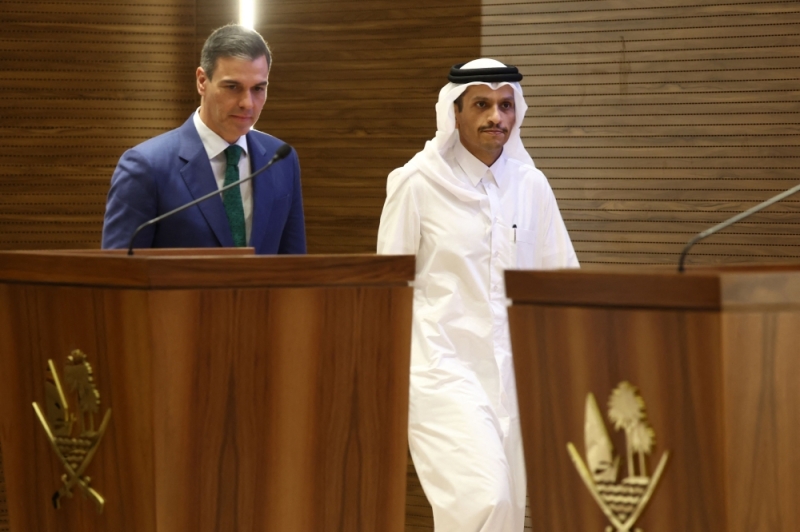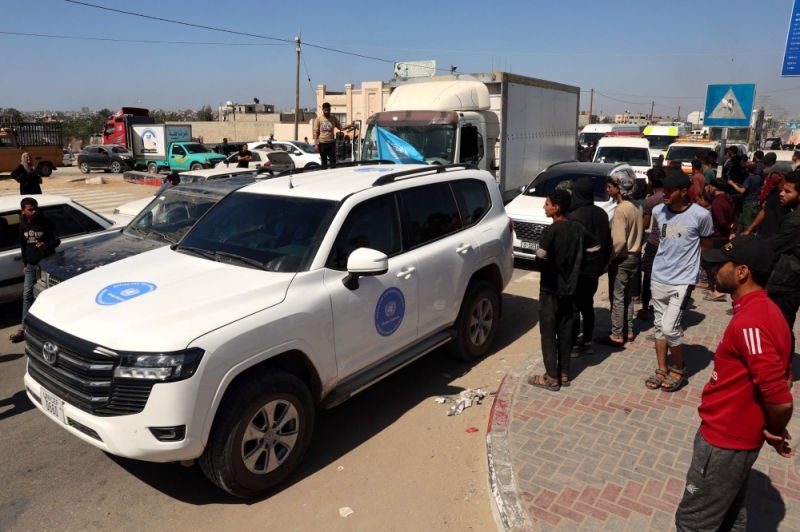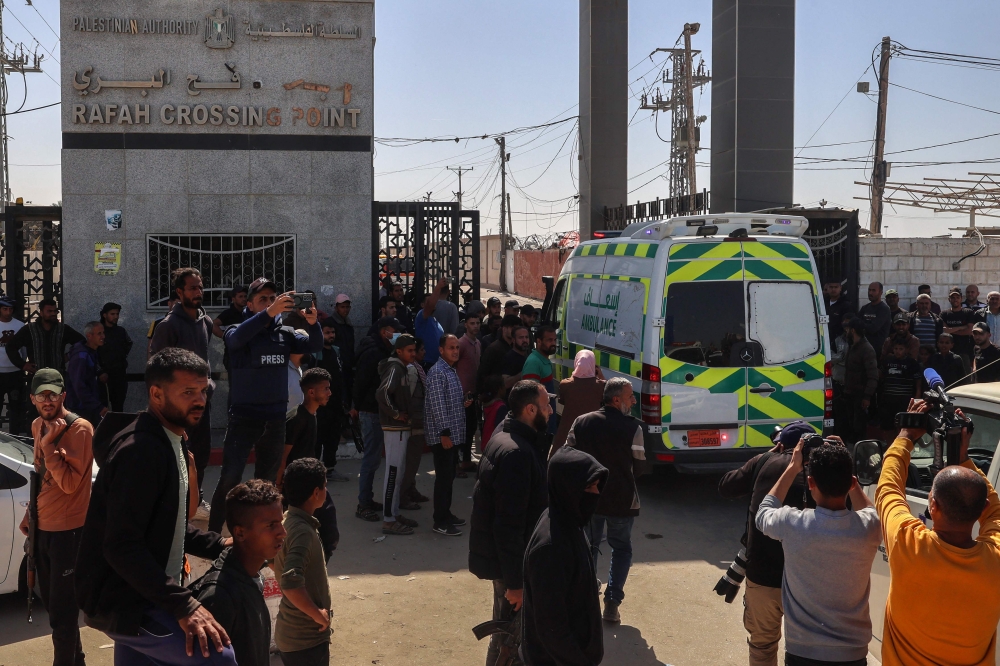by FRANCIS MARTIN

A ship belonging to the Open Arms aid group loaded with canned food destined for Gaza, back in the port of Larnaca, Cyprus, on Wednesday, having returned with 240 tons of undelivered aid after the killing of the aid workers
DIPLOMATIC pressure on Israel has increased this week in response to the killing of seven aid workers. In the UK, the Government is facing calls to suspend the sale of armaments to the country.
On Monday, seven aid workers, including three British nationals, were killed in an Israeli air strike in Gaza which seemed to target a convoy of vehicles belonging to the aid organisation World Central Kitchen (WCK) (News, 5 April).
On Thursday evening, the Archbishop of Canterbury described the incident as “another appalling breach of international humanitarian law in this war”.
Writing on social media, Archbishop Welby said “aid workers can never be a target in war”, and that “far too many humanitarian workers have been killed in Gaza”.
At least 196 aid workers have been killed in Gaza since 7 October, according to the Aid Worker Security Database.
Archbishop Welby reiterated his calls for an immediate ceasefire, the release of hostages, and the unimpeded provision of humanitarian aid, and said that he was praying for the “families and colleagues of those who were killed this week, and all those who have been killed in the last six months”.
Tributes have been paid by the families of the three British men killed in the attack. John Chapman, James Henderson, and James Kirby were former members of the British armed forces, and were working for WCK’s security team.
The others killed were a Palestinian, Saifeddin Issam Ayad Abutahas; an Australian, Lalzawmi “Zomi” Frankcom; Damian Soból, from Poland; and a dual US-Canadian citizen, Jacob Flickinger.
The governments of those killed have strongly condemned the attack. On Tuesday, Rishi Sunak told the Israeli President, Benjamin Netanyahu, that he was “appalled” by the killings.
In a government press release, issued after a phone call between the two leaders, Mr Sunak said that “far too many aid workers and ordinary civilians have lost their lives in Gaza,” and that the situation was “increasingly intolerable”.
He demanded a “thorough and transparent independent investigation into what happened” to the WCK convoy.
The cars in which the aid workers were travelling were marked with the organisation’s logo, and it has been reported that they were not travelling in close proximity to each other when a series of strikes were made.
Mr Sunak, the statement said, “reiterated that Israel’s rightful aim of defeating Hamas would not be achieved by allowing a humanitarian catastrophe in Gaza”.
The incident has led to further expressions of concern about Israel’s conduct of the war in Gaza. In the United States, President Biden said that he was “outraged”. The UN secretary-general, António Guterres, described the incident as an “inevitable result of the way the war was being conducted”.
The general secretary of the World Council of Churches (WCC), the Revd Professor Jerry Pillay, has condemned the killings. In a statement on Wednesday, he said: “It is tragic that people who give their time in serving others have to lose their own lives. Such attacks, which take the lives of innocent people, are absolutely unacceptable and cannot be justified at any level.”
The fall-out from the attack has led to renewed scrutiny of the UK Government’s approach to arms sales.
On Wednesday, three former Supreme Court justices joined a group of more than 600 legal experts calling for a suspension of arms deals between British firms and Israel, on the basis of “plausible risk of genocide” in Gaza.
In a letter to the Prime Minister, they say that “serious action” is needed in order to “avoid UK complicity in grave breaches of international law”. Lord Sumption and Lady Hale are among the retired senior judges to have signed the letter.
A YouGov poll commissioned before the attack on Monday suggests that a majority of voters in Britain want to see a ban on arms sales to Israel, by a margin of 56 per cent to 17 per cent, The Guardian reported.
Speaking on Radio 4’s Today programme on Wednesday morning, Lord Sumption said: “It seems to me that if you have a duty — as we do — to prevent genocide, and there is a plausible case that is what is happening, you should do what you can to obstruct it.”
Last week, the UN special rapporteur on human rights in the occupied Palestinian territories, Francesca Albanese, presented a report in which she wrote: “There are reasonable grounds to believe that the threshold indicating the commission of the crime of genocide against Palestinians as a group in Gaza has been met.” Israeli officials dismissed the report (News, 27 March).
OTHER STORIES
Aid-worker victims in Gaza were targeted, says NGO
SEVEN aid workers have been killed in Gaza in an Israeli air strike, it was reported on Tuesday morning

The Liberal Democrats and Scottish National Party have called on the Government to block arms exports, while the Labour Party has asked the Government to publish any legal advice it has received on the risk that UK-made equipment is being used in breaches of international law.
In late March, a group of 107 MPs, along with 27 members of the House of Lords, signed a letter calling for the suspension of arms exports (News, 27 March). On Wednesday, the Labour MP, Zarah Sultana, who coordinated the letter suggested that Parliament should be recalled from its Easter recess in order to discuss the issue.
According to a recording of a Conservative Party fund-raising event leaked to The Observer this week, the Conservative MP Alicia Kearns has said that the Foreign Office has “received official legal advice that Israel has broken international humanitarian law but the Government has not announced it”.
This week, the Corporation of The Church House has been asked to explain how hosting the Royal United Services Institute (RUSI) Land Warfare Conference coheres with its ethical lettings policy (News, 3 April).
Humanitarian organisations operating in Gaza are taking further measures to keep their workers safe, following the attack on the WCK convoy, and are reiterating calls for a ceasefire.
On Wednesday, the UN announced that its night-time operations in Gaza would be suspended for “at least 48 hours” in response to the killings.
A UN spokesperson, Stéphane Dujarric, told journalists in New York that the attack on the WCK convoy has had a “psychological and chilling effect on humanitarian workers, both Palestinian and international, who continue to do their utmost to deliver aid to those who need it”.
Several NGOs, including WCK, American Near East Refugee Aid (Anera), and the health charity Project Hope, have paused their work in Gaza in response to the attack.
But on Wednesday, Christian Aid’s head of Middle East policy and advocacy, William Bell, said that the charity would “not be stopping or scaling down our life-saving humanitarian work in Gaza”.
Christian Aid operates through partners in the area to provide food and shelter and medical support. “Our partners have strict security measures in place, but, of course, they are not safe, and live in constant fear of being killed,” Mr Bell said.
“They are just trying to survive — as all civilians in Gaza are — what the ICJ believes might be genocide. The only way to stop the killing and ensure a safe and effective humanitarian response is with an immediate and permanent ceasefire.”
Pressure on Mr Netanyahu’s government is also mounting in Israel. On Wednesday, families of the 130 Israeli hostages still being held by Hamas stormed the Knesset, demanding a greater focus on extracting the hostages.

Spanish Prime Minister Pedro Sanchez and his Qatari counterpart Sheikh Mohammed bin Abdulrahman bin Jassim al-Thani leave the podium after giving a joint press conference in Doha on April 3, 2024. —
Thursday, 04 Apr 2024
DOHA, April 4 — Spanish Prime Minister Pedro Sanchez said yesterday the response of his Israeli counterpart Benjamin Netanyahu to an air strike that killed seven aid workers was “insufficient” and “unacceptable”.
“We are waiting for a much more detailed clarification of what the causes have been, bearing in mind that the Israeli government knew about the actions and the itinerary of this NGO on the ground in Gaza,” Sanchez told a Doha news conference at the end of a three-nation tour of the Middle East.
“It seems to me absolutely unacceptable, insufficient,” he added when asked about Netanyahu’s statements about the tragedy.
US-based food aid organisation World Central Kitchen — founded by Spanish-American celebrity chef Jose Andres — said it was pausing its operations in Gaza after the “targeted Israeli strike” on Monday killed Australian, British, Palestinian, Polish and US-Canadian staff.
Netanyahu later admitted Israel’s military had “unintentionally” killed them in an air strike.
He said it was a “tragic case” that would be investigated “right to the end” but stopped short of apologising for the deaths.
The Israeli army said Tuesday it would hold an investigation into the air strike and pledged to “share our findings transparently”.
Sanchez has been one of the most critical voices in Europe over the way Israel has conducted its military campaign in Gaza in response to Hamas’s October 7 attacks.
He has repeatedly said the only solution to the Israeli-Palestinian conflict is the recognition of two states, Israel and Palestine.
Sanchez said yesterday that Spain would recognise Palestinian statehood “as soon as possible, when the conditions are right and in such a way that this decision will have the most positive impact possible”.
While he did not give a timeline, Spanish media reported Tuesday that he told journalists accompanying him on his Middle East trip that he wants to take this step during the first half of this year.
At the same time, Sanchez called for “the recognition of Israel by its Arab neighbours”, saying “mutual recognition is the key to achieving a lasting solution to this conflict”.
Sanchez began his Middle East tour in Jordan on Monday, before travelling to Saudi Arabia then Qatar.
Both Saudi Arabia and Qatar do not have official ties with Israel. —
Israel fires two officers after finding grave errors in strike on aid workers

JERUSALEM, April 5 — The Israeli military dismissed two officers and formally reprimanded senior commanders after an inquiry into the killing of seven aid workers in an air strike in Gaza this week found serious errors and breaches of procedure, the military said.
The inquiry found Israeli forces mistakenly believed they were attacking Hamas gunmen when drone strikes hit the three vehicles of the World Central Kitchen aid group late on Monday night, and that standard procedures had not been followed.
“The strike on the aid vehicles is a grave mistake stemming from a serious failure due to a mistaken identification, errors in decision-making, and an attack contrary to the Standard Operating Procedures,” the military said in a statement issued today.
The killing of the seven aid workers, who included citizens of Britain, Australia and Poland, a dual US Canadian national and a Palestinian colleague, triggered global outrage this week.
In a call with Israeli Prime Minister Benjamin Netanyahu yesterday, US President Joe Biden threatened a shift in US policy towards Israel unless it reduced harm to civilians in Gaza, which already depended on aid before the war and has seen hunger spread since fighting began six months ago.
Following the publication of the findings, World Central Kitchen demanded an independent commission to investigate the incident. “Without systemic change, there will be more military failures, more apologies and more grieving families,” according to a statement published by WCK.
The army had already acknowledged that the seven WCK employees had been killed in an airstrike but the unusually swift investigation underlined the impact the incident has had on world public opinion.
Jose Andres, the chef who founded World Central Kitchen, said this week the seven workers had been targeted “systematically, car by car” as they moved to seek shelter when their vehicles were hit in succession.
The military said it had dismissed a brigade chief of staff with the rank of colonel and a brigade fire support officer with the rank of major, and formally reprimanded senior officers including the general at the head of the Southern Command.
The case was also handed over to the military advocate general to consider a possible criminal investigation, the military said.

Bag mistaken for a rifle
The convoy hit was the second of four planned missions to deliver some 200 tons of food brought to Gaza by sea last month under the management of WCK as part of efforts to increase the amount of aid getting into the enclave.
The military said that as the aid convoy the light vehicles were accompanying was travelling down the coastal road in Gaza towards a logistics point late on Monday, armed suspects had climbed on to at least one of the trucks.
The army showed reporters drone footage of a man on top of a lorry firing a rifle, which a spokesperson said had prompted the military to try, unsuccessfully, to contact WCK coordinators.
After the convoy reached a hangar and the trucks were unloaded, the three WCK vehicles had left the location and turned south down the coast road shortly after 11pm (2100 GMT). However, commanders could not see their identifying logos in the dark and did not identify them as belonging to WCK.
Yoav Har-Even, the former major general who led the inquiry, said forces had acted on the mistaken belief that the vehicles had been seized by Hamas fighters.
As the cars left the hangar, one of the men getting into the vehicles had been carrying a bag which the operators watching drone footage took to be a rifle.
“The state of mind at that time was that the humanitarian mission had ended and that they were tracking Hamas vehicles with one suspected gunman, at least one suspected gunman, that they misidentified to be inside one of the three cars,” he told reporters in a briefing.
“They struck that car and then they identified people running out of the car and entering a second car, which is when they decided to strike the second car. Then two people left the second car and entered the third car, which is when they struck the third car.”
Those strikes were in breach of IDF standard operating procedures, he said.
The army pledged to address the fact that it had been unable to see the rooftop logos in the dark as part of a wider package of lessons to draw from the disaster. — Reuters
No comments:
Post a Comment